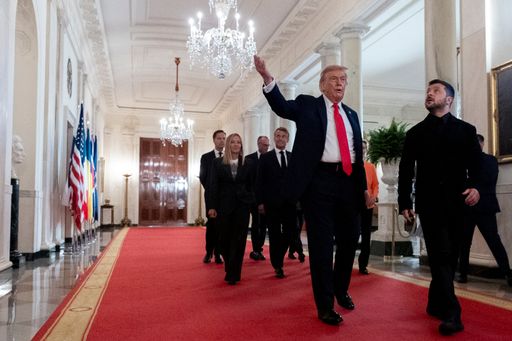The Putin–Trump summit in Alaska on 15 August has raised hopes that the Russian and Ukrainian presidents might themselves hold a bilateral meeting to address the war directly.
But recent signals from the Kremlin and the Russian foreign ministry suggest that such a meeting is not likely to happen soon.
Why is it so difficult for the two leaders to sit down, even with the encouragement of mediators, including the president of the United States? When Trump and Putin can meet, why can't Putin and Zelenskyy sit at a negotiation table?
According to Trump, one of the main obstacles is the “tremendous amount of hatred” between Russian and Ukrainian leaders, which he called the single greatest barrier to peace.
But why do they hate each other?
Zelenskyy regards the Kremlin leadership as a bullying, occupying force, which he says holds a “widespread culture of hatred toward other nations” beyond Ukrainians.
Moscow, on the other hand, accuses Zelenskyy of harbouring not only a deep hatred toward Putin but also an animus against Russians as such.
Bully vs ‘Neo-Nazi’
In an interview in April, Zelenskyy said he hated Putin “100 percent. Not even 99.9 percent.”
In another speech addressing the Ukrainian parliament, he described Russia as a country which “views all its neighbours as slaves or enemies”, Ukraine included.
Putin has not made any public statement committing to such a level of hatred toward Zelenskyy, but he definitely does not like the Ukrainian leader and sees him and his government as a “neo-Nazi regime”, acting as a proxy for the West.
This framing relies in part on the memory of the Second World War.
During WWII, some parts of Ukrainian society, including leaders like Stepan Bandera, formed connections with Nazi Germany's leadership against the Soviet Union, which included Ukraine. The Nazi-Soviet war between 1941 and 1945 resulted in at least 27 million Soviet citizens' deaths. As a result, for many Russians, any glorification of Bandera amounts to glorification of Nazism.
In current Ukraine, there are mixed feelings toward the Soviet-Nazi war, but there is a widespread sympathy toward Bandera, whom many Ukrainians see as a symbol of Kiev’s independence bid rather than a Nazi collaborator.
That celebration enrages Russians.
“Glorification of Ukrainian Adolf Hitler, who is Stepan Bandera, should be stopped,” Sergei Markov, a Russian academic and former adviser to Putin, tells TRT World. Like Putin, Markov insists that Zelenskyy leads a neo-Nazi government.
Asymmetric relationship
While the Trump-Putin summit has echoed the metrics of a Cold War-era meeting, the situation for Zelenskyy and Putin is much different due to not only the mutual hatred at the leadership level but also the asymmetric character of the relationship between the two countries, according to experts.
The fact that Western leaders have to stress Putin’s supposed willingness to meet with Zelenskyy — while the Kremlin avoids any firm commitment — illustrates how asymmetric the situation remains, says Linas Kojala, head of the Geopolitics and Security Studies Centre in Vilnius.

“For Putin, a face-to-face with Zelenskyy is deeply unattractive, yet at the same time, he cannot simply say ‘no’ to Trump without consequences,” Kojala tells TRT World.
For Trump, however, such a meeting could be a diplomatic victory — an image he is eager to project. He believes there has to be a shake-up if there is to be any breakthrough, even if that prospect remains distant, Kojala adds.
In Alaska, Putin met Trump in what David R. Marples, a historian at the University of Alberta, calls “a propaganda summit”: the Russian leader “received a red carpet and was treated as the senior partner, despite the fact that the United States is a far superior power both economically and militarily.”
But Putin is less likely to extend that courtesy to a man whose country’s very existence he denies, especially at a time when Russia is making territorial gains, Marples tells TRT World.
On the other hand, Russians do not want to meet Zelenskyy, whom they accused of making statements not only against Putin but also against ethnic Russians in Ukraine.
They point to one remark in which he allegedly told residents of Donbas who identified as Russian: “I think that, for the future of your children and grandchildren, once you love Russia and have spent your whole life on the territory of Ukraine and have felt that it is Russia, then you should realise that, for the sake of your children and grandchildren, you have to go and find a place in Russia. This would be correct.”
In such a climate, a handshake across the table seems far away.



















